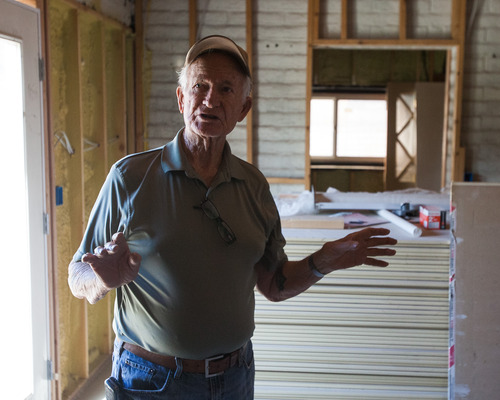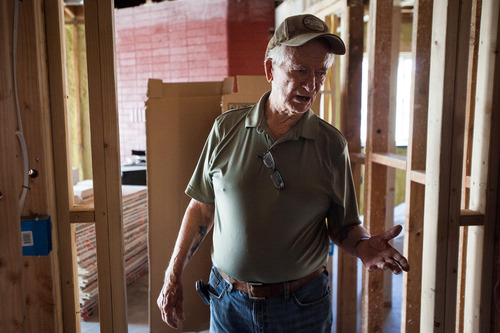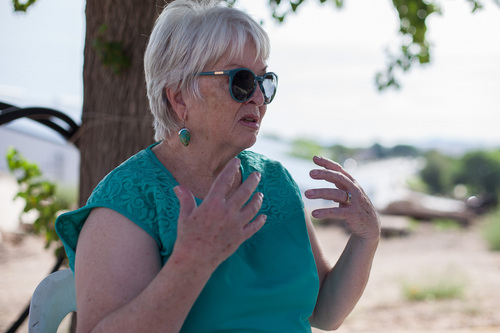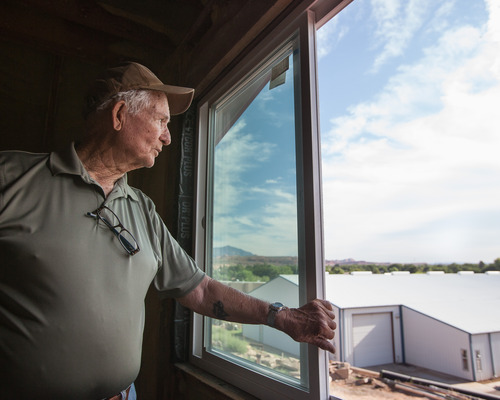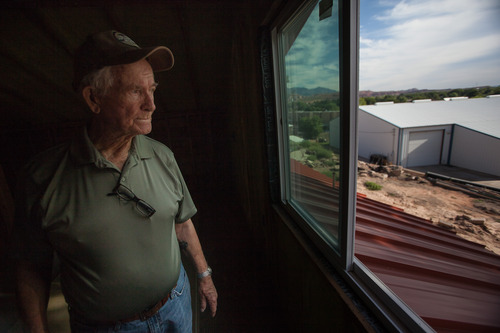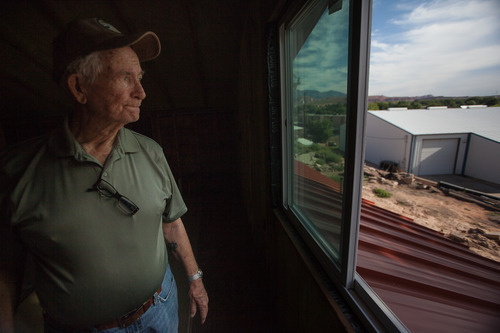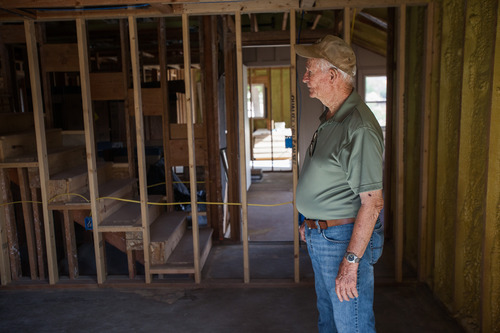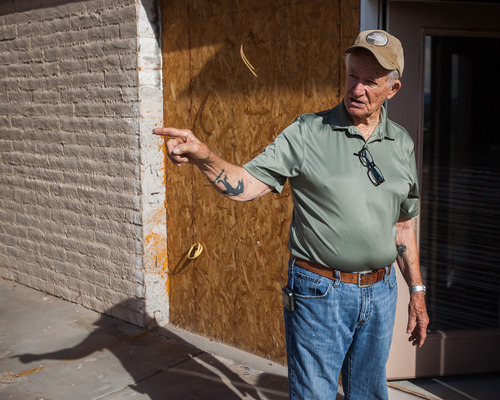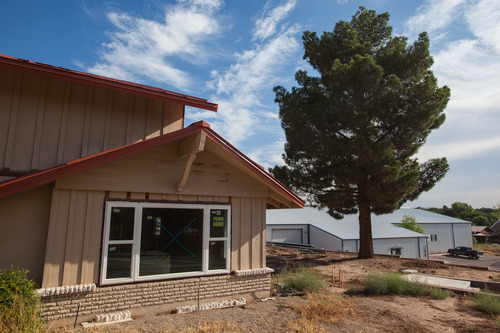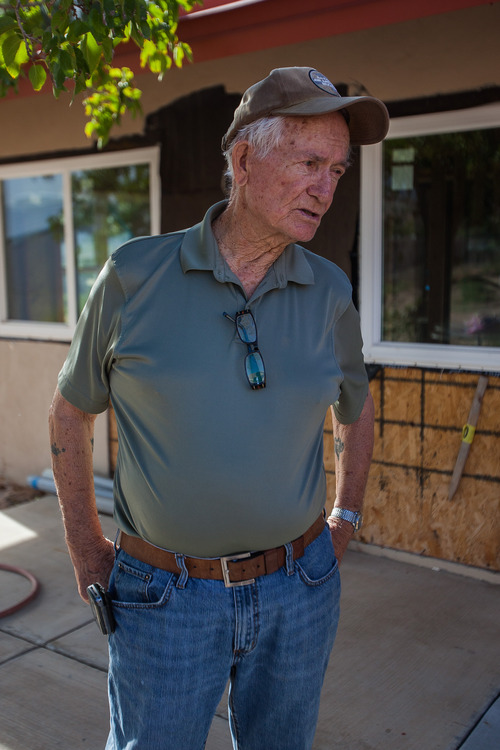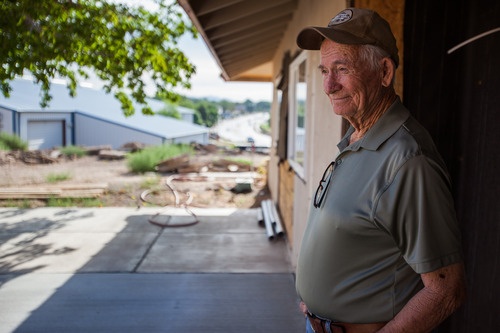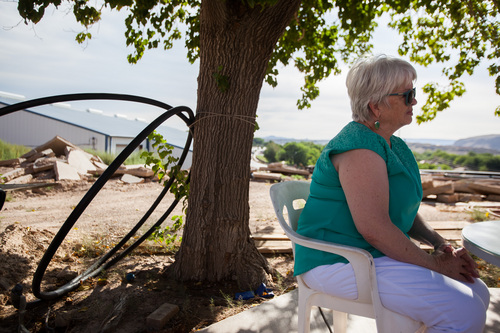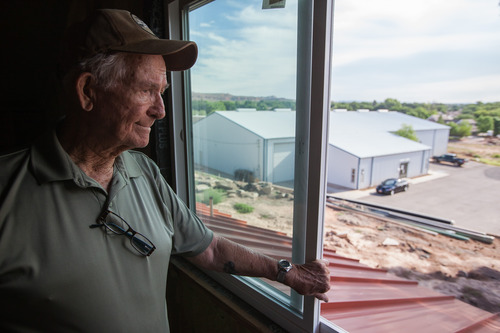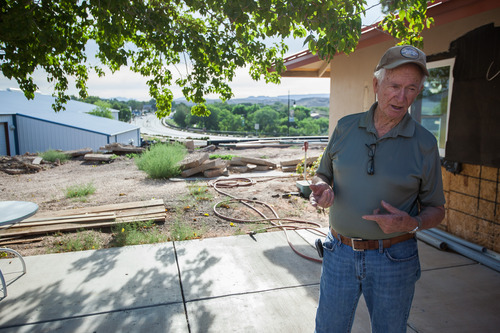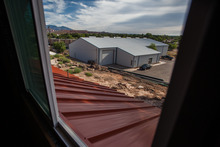This is an archived article that was published on sltrib.com in 2013, and information in the article may be outdated. It is provided only for personal research purposes and may not be reprinted.
Washington City • As often as he can, Don Kimball works to renovate a big home that will offer secure apartments for women and children who have fled domestic violence and exhausted their time in shelters.
But literally a stone's throw away, a gunsmith shop plans a shooting range with 11 lanes, one for tactical weaponry used by law enforcement, that point at Kimball's property.
The fact that the range has been approved by Washington City is painfully personal for Kimball and his wife, Sue — in 1983, their daughter Erin and her two small children were shot to death by her husband, who then killed himself.
The home sits just above Dixie GunWorx, whose website says, "We do it all: Buy, Sell, Trade, Find, Fix, Modify and Transfer."
The operation was granted permission by the City Council to build the range, which could be open from 9 a.m. to 10 p.m. Monday through Thursday and 10 a.m. to 10 p.m. on Friday and Saturday.
Sue Kimball, who with her husband founded the Erin Kimball Memorial Foundation 14 years ago, says the idea that their tenants might hear the gunfire "makes me sick."
Erin's and the children's lives, she said, "ended with gunshots, and the only thing we have on the death certificates is multiple gunshots to all three of them. It's such a violation of our work and of our daughter, literally."
—
Terror • Yvette Rodier, who survived multiple gunshot wounds in 1997 at Little Dell Reservoir, tells of her ongoing torment from the attack. Firearms, a balloon popping, gunshots on TV, a car backfiring and fireworks all leave her frozen in place, her heart beating wildly.
"It's just terror, pure terror," she said. "I would like to think time would help, but 17 years later, I still can't get my brain around it. I can't imagine those women [at the Kimball] home, who want to feel safe."
Dixie GunWorx first appeared before the city's Planning Commission on July 23. CEO Chris Michel and his business partner, Jacob Cooper, described the noise abatement, safety precautions and timeline for the range, according to meeting minutes.
For safety, they said, the back wall would include rubber mats over steel-plated ballistic panels in front of an 8-inch-thick cinder brick wall filled with concrete. If a bullet were to get through the steel panel and the wall, it would hit a dirt bank.
Cooper said gunshot noise would not be heard if a person was standing next to Telegraph Street in front of the gunsmith shop and the Kimball home. The ceiling would be fitted with sound baffles.
Cooper "stated he isn't convinced there would be any sound louder than traffic," according to the minutes.
Neither Cooper nor Michel responded to Salt Lake Tribune telephone messages to their business. However, Michel told Fox13 TV in August that he's thankful to the Kimball home "for what they do for the victims themselves. [We hope they] take some of our classes. We would love to do that for anybody that's been that kind of a victim, for free. Some of the classes we're going to be able to help them with are self-defense, home defense, rape prevention."
But Sue Kimball, herself a victim of violence in her first marriage, told the council that the Erin Kimball Foundation "is a place for families fleeing domestic violence and … trying to get away from knives and guns, any form of weapons."
—
Safe place • The home will have the foundation's offices, meeting rooms and baths and laundry room on the main floor. The upper floor will have three apartments of varying size where tenants can stay for up to two years.
The gun shop can be seen through the windows in the east-facing apartment. Don Kimball will build a playground on the property and a wall between the home and the gunsmith shop.
Still, he said, "You can't build a wall high enough."
All told, Sue Kimball and her employees and volunteers plan to offer counseling, housing assistance and other services to about 150 people a year.
She also told the Planning Commission that for other people living in the area, which includes homes and apartments, the gun shop is not a good fit.
Planning Commission Chairman Rick Schofield said during the meeting that he has donated to the foundation and has a concealed-weapons permit. He also wondered why a gun-repair shop would "come next to a facility that houses domestic violence [victims] and why they would want to create a shooting range," according to the minutes.
"He stated if there was a halfway house for pedophiles and a day care wanted to come in, it would bother him as much as a facility dealing with domestic violence next to a shooting range … it just doesn't make sense," according to the minutes.
In the end, the Planning Commission voted 3-2 to deny the permit. Barely a week later, the mayor and City Council, acting as the appeal authority, granted it. The authority was working as a "quasi-judicial" body, meaning there was no testimony, and its decision cannot be administratively appealed. A yearly compliance review will be required.
As the council convened, Sue Kimball said, Councilman Ron Truman said he believed in the Second Amendment, the right to a trained militia and "the right to carry [weapons] everywhere, at any time, under any condition."
—
Victims of violence • Sue Kimball, who is Erin KImball's stepmother, went to graduate school after Erin and her children — a 3-year-old and an infant — were killed near the Salt Lake City International Airport.
She was working at a regional domestic-violence center when she "realized how critical housing was — it's a choice of going back to violence or living on the street," she said.
With funding from the federal Housing and Urban Development, the Justice Department, the Eccles Foundation, the Daniels Fund, Allstate Insurance, individuals and civil and religious organization, the Kimballs bought the house on Telegraph Street.
What did surprise her, she said, was that in considering a community development block grant (CDBG), the City Council asked what the foundation does and who it serves "and were strongly supportive of us building this property."
The council sponsored the foundation for a $150,000 federal grant, said Councilman Thad Seegmiller.
Kirk Smith, a former Washington County sheriff and a veteran of the Utah Highway Patrol, sits on the board of the Erin Kimball Foundation. He worries about the indoor shooting range but fears more an accidental firearm discharge outside the shop, which is near schools, a Wal-Mart and other businesses and residential areas.
"I don't know how you can bulletproof the parking lot," Smith said. "You could have an accidental discharge. Even in an environment with professional people, things do happen, even in the safest conditions.
Moreover, Smith added, the issue is not about the Second Amendment, as Truman suggested before the Appeal Authority meeting.
"I would never challenge their personal opinions," Smith said. "Maybe it's more of a fear of being thought to be opposed to the Second Amendment. But I could be wrong."
"We want something better. The Erin Foundation offers peace and help," he said. "It hurts when you hear other people who think target practice is more important."
Seegmiller said the council has decided to review Dixie GunWorx's conditional-use permit every year, but he believes the gunfire won't be heard.
"If there are safety or noise concerns down the road," Seegmiller said, "we would have to address their conditional-use permit."
As for the Erin Kimball Foundation, he said, "we see value in the fund and the good that they do. We strive to be business-friendly. It's hard making decisions on what's compatible and what's not. We hope both entities contribute to the city in their own right."
On Friday, foundation leaders filed a lawsuit against the City Council over its approval of the range, calling it "illegal, arbitrary and capricious, and not based on substantial evidence."
The Kimballs are asking the 5th District Court in Cedar City to reverse that decision.


